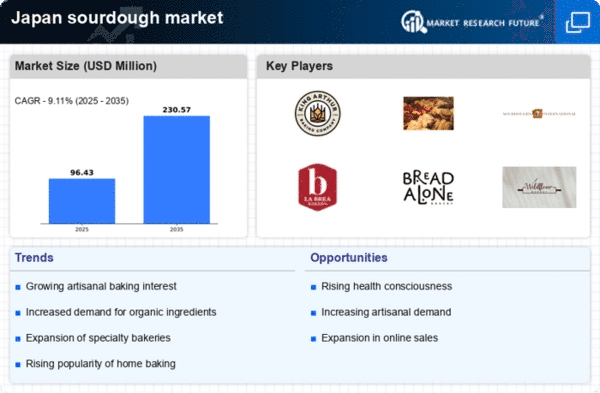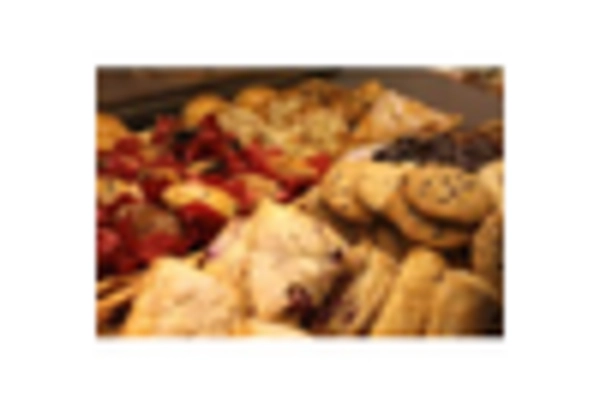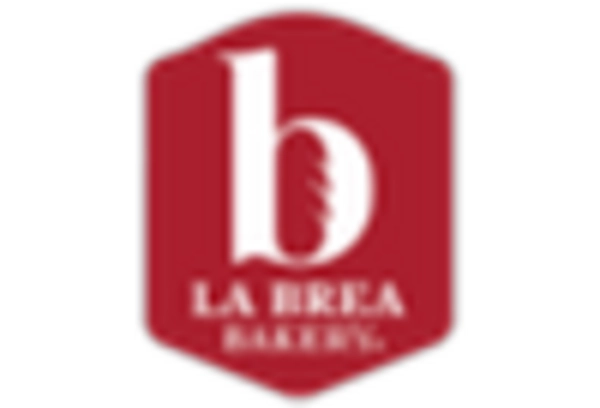Expansion of Specialty Bakeries
The expansion of specialty bakeries focusing on sourdough is a key driver in the sourdough market. These establishments are not only increasing in number but are also diversifying their offerings to include various flavors and styles of sourdough. Recent data indicates that the number of specialty bakeries in urban areas of Japan has grown by approximately 25% over the past few years. This proliferation is indicative of a growing consumer base that seeks unique and high-quality bread options. As these bakeries continue to innovate and cater to diverse tastes, the sourdough market is likely to experience sustained growth, attracting both traditional bread consumers and those seeking novel culinary experiences.
Increased Interest in Home Baking
The surge in home baking activities among Japanese consumers is a significant driver for the sourdough market. As individuals seek to recreate bakery-quality bread at home, sourdough has emerged as a popular choice due to its unique flavor and texture. Recent surveys indicate that approximately 30% of households in Japan have engaged in baking during the past year, with sourdough being a favored option. This trend not only boosts the demand for sourdough starter kits and related baking supplies but also fosters a community of home bakers sharing recipes and techniques. Consequently, the sourdough market is likely to benefit from this growing interest, as more consumers experiment with baking their own bread.
Rising Demand for Natural Ingredients
The increasing consumer preference for natural and organic ingredients is driving the sourdough market in Japan. As health-conscious individuals seek alternatives to processed foods, sourdough, made from simple ingredients like flour, water, and salt, is gaining traction. According to recent data, the market for organic bread in Japan has seen a growth rate of approximately 15% annually. This trend indicates a shift towards products perceived as healthier and more authentic. The sourdough market benefits from this demand, as consumers are more inclined to choose bread that aligns with their values of health and sustainability. Furthermore, the emphasis on clean labels and transparency in food production is likely to enhance the appeal of sourdough, positioning it favorably within the broader market landscape.
Cultural Shift Towards Artisan Products
There is a notable cultural shift in Japan towards artisan and handcrafted products, which significantly influences the sourdough market. Consumers are increasingly valuing craftsmanship and the story behind their food, leading to a rise in demand for artisanal sourdough. This trend is reflected in the growing number of bakeries specializing in sourdough, which have reported sales increases of up to 20% in recent years. The emphasis on traditional baking methods and local sourcing resonates with Japanese consumers, who appreciate the quality and authenticity of artisanal products. As the sourdough market continues to evolve, this cultural appreciation for craftsmanship is likely to drive further growth, encouraging more bakeries to adopt artisanal practices.
Health Benefits of Sourdough Fermentation
The health benefits associated with sourdough fermentation are increasingly recognized by Japanese consumers, contributing to the growth of the sourdough market. Sourdough is known for its lower glycemic index and improved digestibility compared to conventional bread, making it an appealing option for those with dietary concerns. Research suggests that the fermentation process enhances the bioavailability of nutrients, which may attract health-conscious individuals. As awareness of these benefits spreads, it is anticipated that more consumers will gravitate towards sourdough products. This trend could potentially lead to a broader acceptance of sourdough as a staple in Japanese diets, further solidifying its position within the sourdough market.
















